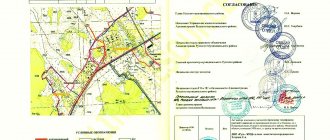The territory in and around populated areas is divided into zones. Each has its own purpose, this is done for the convenience of planning the development. Municipalities reserve the development of part of the land, the remaining territories can be leased or purchased for their own needs. The main thing is that the goal coincides with the purpose of the specific site. Industrial lands are allocated for the construction of industrial facilities, factories, and processing plants. By law, these zones must be located outside populated areas.
Types of industrial land
An industrial zone can become land that is unsuitable for cultivation and cultivation, or for living. These facilities should be located away from residential areas. However, you can often see an industrial area surrounded by urban buildings. This happens because the construction of residential buildings is much more intensive than the industrial development of territories. However, a sanitary zone around the enterprise remains mandatory. In some cities, entire neighborhoods were resettled due to the fact that they found themselves in the sanitary zone of the plant under the new legislation. People were provided with other housing, and houses were demolished or converted into office space.
A plot of land can only be allocated for certain purposes.
Types of permitted use:
- construction of production premises: workshops, boxes, warehouses for the needs of the enterprise;
- development of deposits of ores, valuable rocks, gas, oil;
- chemical, bacteriological enterprises, metallurgical plants;
- mining and processing enterprises and mineral extraction;
- construction of nuclear industry facilities;
- buildings for defense needs;
- construction of space industry facilities;
- for transport and communications.
Legislation on special zones
The Land Code regulates legal relations related to the development and transfer of rights to industrial zones . Chapter 16 is dedicated to this . In addition to the main law, each region develops its own rules and regulations. The general principles of taxation of industrial zones are reflected in Article 394 of the Tax Code of the Russian Federation . Industry on the territory of the country is developing with different intensity: some subjects of the Russian Federation live at the expense of enterprises, others produce practically nothing, do not mine and are not of interest to industries. Therefore, somewhere the tax is higher, somewhere lower to stimulate the regional economy.
The requirements for the location of industrial zones are quite strict: the size and location on the ground are regulated. There is a constant shortage of special purpose land, but the legislation provides for the possibility of transferring a plot from one type to another. The main condition is to prove the feasibility and urgent need for this. Evidence is collected by an interested party: a potential buyer or tenant. Sometimes the municipalities themselves need this.
By law, the owner of a plot in an industrial zone is obliged to:
- protect the environment around the enterprise;
- monitor the safety of marks indicating the turning points of the coordinates of the site;
- use the land in accordance with the sanitary standards of the region;
- make all payments for land on time;
- do not leave the territory undeveloped.
What is industrial land
Industry is a solid foundation for the economy of any country. The number of cities is increasing, and the number of plants, factories and other enterprises designed to provide people with all the necessary benefits is growing.
Some production complexes occupy areas comparable to the size of small settlements, so the territories in which such enterprises operate have special characteristics. Industrial land - what it is, what are its pros and cons, features and nuances of use.
Some production complexes occupy areas comparable to the size of small settlements, so the territories in which such enterprises operate have special characteristics. Industrial land - what it is, what are its pros and cons, features and nuances of use.
Transfer of land into state ownership
The transfer of industrial enterprises into state ownership occurs through the administration of the given region where they are located. After submitting the application, an assessment is made of the appropriate location of the production, its characteristic criteria, land and terrain criteria, and the remoteness of the industrial land from transport routes and the territory of populated areas.
ATTENTION! This is one of the most important requirements, since the location of industrial land should not be located near residential buildings.
The process of transferring land into state ownership is called nationalization of territory. Its meaning is the transfer of the entire enterprise and territory to the power of the state and the termination of private ownership.
Also, in addition to the voluntary transfer of land to the state, it may also be forcibly taken away due to failure to fulfill certain obligations , such as refusal to fulfill one’s part of an international agreement, the need to develop land for Federal and regional purposes, for example, for the construction of energy industries on the lands objects or space stations, and some other grounds at the level of state laws.
Confiscation of land can also occur by court decision for temporary or permanent confiscation of land. The first case involves the return of the territory in the future and the payment of compensation through its use.
Also,
in addition to the voluntary transfer of land to the state, it may also be forcibly taken away due to failure to fulfill certain obligations , such as refusal to fulfill one’s part of an international agreement, the need to develop land for Federal and regional purposes, for example, for the construction of energy industries on the lands objects or space stations, and some other grounds at the level of state laws.
Industrial land: transfer, sale, rent
Keep in mind that industrial areas usually contain buildings and premises of factory buildings, separate structures for carrying out activities to support the work of the main production workshops. The Land Code of the Russian Federation defines the main characteristics of industrial lands and establishes rules for ensuring the operation of enterprises in such territories.
Pipeline transport facilities (OTT)
OTT includes:
- onshore facilities of oil and gas pipeline systems, and pipelines for other purposes;
- structures and facilities for the construction, operation, reconstruction and repair of pipelines and related facilities.
When using land for the placement of OTT, there is no need to transfer the land to the category of “transport land”. Land is provided for the period necessary to carry out a given amount of work. To place underground pipelines, participants in land relations do not even need to formalize property rights - it is enough to impose an easement, the essence of which is to establish a security zone near OTT facilities.
- cosmodromes;
- cosmonaut training centers;
- MCCs, launch sites and complexes;
- technical and experimental bases;
- training grounds, platforms for separating steps, landing, etc. (Article 92).
Types of permitted and prohibited use of land plots
Types of permitted use of land plots that are not subject to urban planning regulations are determined on the basis of the State Real Estate Cadastre.
The State Real Estate Cadastre is a collection of information about registered real estate and the State borders of settlements, municipalities, and zones with special operating conditions. Order of the Ministry of Economic Development of Russia dated September 1, 2014 No. 540 “On approval of the classifier of types of permitted use of land plots” approved the corresponding classifier containing a list of permitted types of use, including codes for them, which are applied throughout the Russian Federation. Industry, codes 6.2.- 6.6.:
- heavy 6.2. (mechanical engineering, metallurgy, mining, when it is necessary to introduce special zones);
- easy 6.3. (production of textiles, clothing, ceramics);
- food 6.4. (baking, drinks, canning);
- petrochemical 6.5. (processing of raw materials, household chemical products);
- construction 6.6. (production of bricks, cement, elevators, fasteners).
On such lands and land plots the production and sale of agricultural products is prohibited . Failure to comply with the law will result in fines and penalties.
- industrial buildings (plants, factories, production workshops);
- cultural and community premises (sanitary, medical, educational institutions, public catering premises);
- other structures (warehouses, utility rooms);
- water bodies (ponds, pools with retaining structures on water outflows).
Transactions on special purpose lands
Like any piece of land, industrial zones can be sold, bought, or rented. An individual or legal entity permanently residing or registered in the territory of the Russian Federation can be the owner of such an allotment. Foreign citizens and organizations can also act as tenants. The lands that have not yet found a buyer belong to the municipality.
Own
As a general rule, the owner of a plot has the right to do any actions with it within the framework of the law:
- master;
- sell;
- expand boundaries by purchasing neighboring plots of the same purpose;
- exchange;
- give and pass on by inheritance;
- rent out.
The difficulty lies in the restrictions on the owner’s rights to develop the site. It must occur in accordance with the purpose of the territory. If the land is planned for the construction of production, it cannot be used for the construction and operation of a car service center with a gas station. When buying a plot in an industrial zone, the future owner must clearly understand this. Buildings that are not related to the purpose specified in the cadastral passport will have to be demolished, since it will be difficult to legitimize them.
In some cases it is possible to transfer land from one purpose to another, but this is usually expensive and impractical.
Rent
You can rent land either from the owner or from the state. In the first case, responsibility for the resulting buildings will remain with the owner of the site. This is reflected in the contract. If the lessor is a municipality, the purpose of the lease is indicated in the application, then in the contract. After receiving the rights to use land in the industrial zone, the tenant is obliged to follow all points of the agreement: erect the agreed building on time, carry out communications, develop the land in accordance with its purpose.
What can be built on industrial land?
Industrial lands are usually not popular among investors with small budgets and are bought up mainly for the organization of a specific business: investments in industrial plots are usually very profitable, but you often have to wait a long time for a “return.”
But a completely different picture has been observed recently in the Moscow region market. Businesses are starting to run out of land allocated for industry. Due to their remoteness from populated areas, they are surrounded mainly by agricultural land. And changing the purpose from “agricultural” to “industrial” is very difficult: you need to prove that the soil is no longer suitable for agriculture.
As a result, we have a constantly growing demand for industrial land. It has already reached even remote areas of the Moscow region. In this connection, we decided to tell you what industrial sites are and what can be built on them.
As a result, we have a constantly growing demand for industrial land. It has already reached even remote areas of the Moscow region. In this connection, we decided to tell you what industrial sites are and what can be built on them.
Purchase and sale of industrial land
The owner of an industrial territory can be a civil or legal entity, enterprise, government or city authorities. With these lands it is possible to carry out various operations permitted by law. Plots can be arranged under a lease agreement, sold, bought, or donated.
The only difficulty that may arise along the way is the type of acceptable use. For example, if the land is intended for the construction of a factory, a businessman will not be able to build a gas station or set up a market on this site. Before you rent with subsequent purchase or buy outright an industrial territory, pay attention to the availability of gas, electricity, and water supply. If all this is not on the site, the land can be sold at an affordable price.
There are some other points that are best taken into account before purchasing. For example, this is the topography of the earth and its climatic features. It is also necessary to take into account the sanitary zone, which depends on the type of activity of the future building .
The sanitary zone is necessary to fulfill obligations to environmental protection and is an intermediate territory between the enterprise and residential premises.
If there is a hazard class, the size of the sanitary protection zone can reach several kilometers. This is done for the safety and health of people and animals.
Dimensions are calculated based on the determination of the dissolution of harmful substances in the air. The presence of winds, with the help of which harmful substances are scattered over long distances, must also be taken into account. But, if you think about future development, acquiring such territory may not be profitable. When looking for a plot of land, think about whether you will lose energy and time by applying for a building permit. This lengthy procedure can take years.
There are some other points that are best taken into account before purchasing. For example, this is the topography of the earth and its climatic features. It is also necessary to take into account the sanitary zone, which depends on the type of activity of the future building .
Features of industrial land
To ensure optimal functioning of the enterprise, its own infrastructure can be created in such a territory. Land allocated for industry usually does not have soil fertility, but may contain mineral deposits (for example, natural gas, oil, etc.).
The following can own industrial land:
- individuals;
- state;
- legal entities.
Not every land plot can be transferred to the industrial category.
There are 4 main difficulties that a buyer of industrial land may encounter:
- impossibility of building the real estate objects the person needs (inconsistency between the entrepreneur’s intentions and the intended purpose of the site);
- the high cost of such lands (usually the territory is sold cheaper if it lacks the necessary communications, the installation of which will be quite expensive for the new owner);
- paperwork when completing a transaction and obtaining permission to build a particular facility on the acquired territory;
- the risk of transferring land into state ownership (in practice, this rarely happens, in cases provided for in Articles 49–51 of the Land Code of the Russian Federation).
Transfer of land into state ownership
In a historical context, this practice existed during abrupt changes in government power. This process is called nationalization and means the cessation of private property and the nationalization of the entire requisitioned mass. Similar cases are known in the history of many countries.
Modern legislation considers several situations in which private ownership of land can be limited, temporarily or permanently terminated. Data on all grounds, procedures and consequences are contained in the seventh chapter of the Land Code of the Russian Federation, in articles 49 - 51.
Confiscation of land is allowed as an exception if:
- we are talking about the implementation of any international treaties;
- it is necessary to build and reconstruct federal or regional energy, defense, communications, and transport facilities, and this can only be done with the seizure of land;
- There are other justifications at the level of federal laws.
What structures are legal to build in an industrial zone?
The construction of any structure cannot begin without:
- project;
- building permits;
- estimates and budget.
Even if the land is privately owned, permission to construct the facility must be obtained. The building must correspond to the category of land and the intended purpose of the territory.
The following are prohibited for construction on industrial land:
- residential buildings: low-rise and large;
- objects of a social nature: schools, hospitals, boarding schools;
- cultural objects: museums, exhibitions, etc.
For all buildings that do not comply with the regulations, a demolition order (usually a court order) will be issued, and the owner will bear administrative liability (a fine).
Changing the site category
In what cases does it become necessary to change the type of permitted use of a site:
- the owner of the enterprise wants to expand production, but his plot borders on lands from other categories: individual housing construction, SNT, agricultural activities, etc.;
- the owner of the individual housing construction plot wants to continue the construction of residential buildings, but the neighboring plot belongs to the category of industrial land.
A change is possible in both cases. Practice shows that it is easier to change the purpose from industrial to any other than, on the contrary, to designate a site for industrial purposes.
Changing the category is possible only if there is a proven urgent need and all conditions set by the state are met.
You may need:
- prove that the land is not suitable for agriculture because its resources are depleted;
- convince that it is impossible or impractical to build residential and social facilities in this area;
- carry out additional procedures: restore the relief, enrich the soil, carry out utilities, etc. The initiator of the transfer must not only provide all this on the plans, but also do it on the ground before the land changes category.
The order of translation is as follows:
- provide data about the plot to the Land Committee, an application to change the category, justification for this;
- fulfill all requirements for preparing the site for transfer;
- coordinate the construction of each facility in accordance with the new intended purpose of the land.
Only the intended purpose can be changed: the industrial zone allocated for the factory can be converted into land for a motor depot and storage of petroleum products. The principle is the same: justify the need, back it up with facts, follow the instructions of the Land Committee.
The ZK has the right to refuse the owner of the site to execute the application. Then the owner remains:
- develop the land for its intended purpose;
- do not expand production capacity at the expense of neighboring plots, but buy plots in other areas;
- relinquish possession: sell or requisition.
What is classified as industrial land?
In relation to Art. 88 of the Land Code of the Russian Federation, industrial lands include areas that are used or intended for:
- mineral extraction services provided by mining and oil and gas industry enterprises;
- enterprises of the chemical, manufacturing, metallurgical industries;
- lands occupied by factories, factories, quarries, mines, mines, mines;
- placement of industrial and administrative buildings, structures, structures and facilities serving them, in order to ensure the activities of organizations and the operation of industrial facilities.
Requisition
This concept refers to the transfer of an industrial zone into state ownership. The transition can be voluntary, at the initiative of the owner, or under duress - as necessary by the state.
Requisition can affect any areas. However, most often it affects the industrial zone. As part of this process, the right of disposal of the private owner is limited or terminated and transferred to the municipality.
Grounds for requisition:
- the court's decision;
- an interethnic agreement has been concluded;
- in this territory it is necessary to build objects responsible for the security of the state, objects of federal significance (highway, airport or railway station, etc.);
- other reasons: reasoned and not violating the law.
In most cases, requisition deprives the owner of the rights to the land plot forever. Occasionally, a decision is made to temporarily restrict these rights. In this case, the limitation period is specified, the owner receives compensation, and at the end of the period the right of disposal is returned.
Industrial zone tax
Owned industrial plots are subject to tax. Its size is determined by the Tax Code and regional legislative documents.
According to the Tax Code, paying the treasury for an industrial zone is much more expensive than, for example, for an agricultural plot or land for residential areas. This is primarily due to the environment. Any production, one way or another, affects the environment: it depletes the surrounding land, reduces air purity. In addition, the proximity of enterprises makes neighboring plots cheaper.
The federal tax on industrial land is 1.5% of the cadastral price of the site. Considering that the cadastral value of such lands is high, the tax is significant. In some regions, local legislation reduces the tax rate in order to develop industry. But the tax still remains high.
If the cadastral value exceeds the market value, the owner can go to court to initiate a review of this value. This can significantly reduce your tax rate.
Owners strive to develop industrial lands as quickly as possible so that they generate income and cover expenses.
Industrial lands are
The process of building factories and factories became a logical continuation of the existence of small workshops, which at a certain time ceased to satisfy the demands of goods manufacturers.
As a result, we now have huge production complexes, comparable in size to entire towns. It is clear that land resources are needed for the construction of industrial enterprises, and they were allocated as a separate category for special purpose.
If you want to find out how to solve your specific problem, please contact the online consultant form on the right. It's fast and free! Or call us at :
+7 Moscow, Moscow region
+7 St. Petersburg, Leningrad region
8 Federal number (free call for all regions of Russia)!
According to the Land Code, federal laws and laws of the constituent entities of the Russian Federation, industrial lands are those land resources that are located outside the boundaries of settlements and are used or intended to support the activities of organizations and the operation of industrial facilities.









